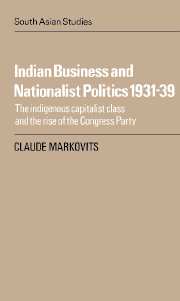 Indian Business and Nationalist Politics 1931–39
Indian Business and Nationalist Politics 1931–39 This work has shown that during the 1930s the political attitude of Indian capitalists was characterized by sudden shifts and sharp turns. Three major phases can be distinguished: a phase of relative unity in 1930–1931, a phase of open split in 1932–1936 and a new phase of greater unity in 1936–1939.
During the first phase the onset of the depression and the nature of the governmental response to it led most interest groups and factions in Indian business to give some support to Gandhi's political campaign against the Raj, while at the same time they tried to limit the scope of the movement. Many businessmen obviously hoped that a mass campaign would force the British at least to make some changes in a financial and monetary policy which tended to aggravate the impact of the depression. But as early as the end of 1931 it was becoming clear that the government had no intentions of changing its policy and was waiting for an opportunity to crush the Civil Disobedience movement.
This caused a gradual split in the ranks of Indian big business. An important group, led by the Tatas and comprising most of Bombay's industrialists, sought to exploit as much as possible the benefits which, in a time of depression and restriction of world trade, the imperial connection could bring to Indian capitalists – namely an easy access to the British market and some protection against non-British competitors on the Indian market. They were drawn towards openly opposing the Congress, accepting imperial preference as embodied in the Ottawa agreement and even concluding a pact with Indian industry's arch-enemy, Lancashire.
To save this book to your Kindle, first ensure [email protected] is added to your Approved Personal Document E-mail List under your Personal Document Settings on the Manage Your Content and Devices page of your Amazon account. Then enter the ‘name’ part of your Kindle email address below. Find out more about saving to your Kindle.
Note you can select to save to either the @free.kindle.com or @kindle.com variations. ‘@free.kindle.com’ emails are free but can only be saved to your device when it is connected to wi-fi. ‘@kindle.com’ emails can be delivered even when you are not connected to wi-fi, but note that service fees apply.
Find out more about the Kindle Personal Document Service.
To save content items to your account, please confirm that you agree to abide by our usage policies. If this is the first time you use this feature, you will be asked to authorise Cambridge Core to connect with your account. Find out more about saving content to Dropbox.
To save content items to your account, please confirm that you agree to abide by our usage policies. If this is the first time you use this feature, you will be asked to authorise Cambridge Core to connect with your account. Find out more about saving content to Google Drive.